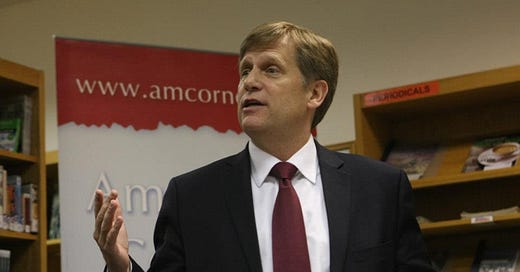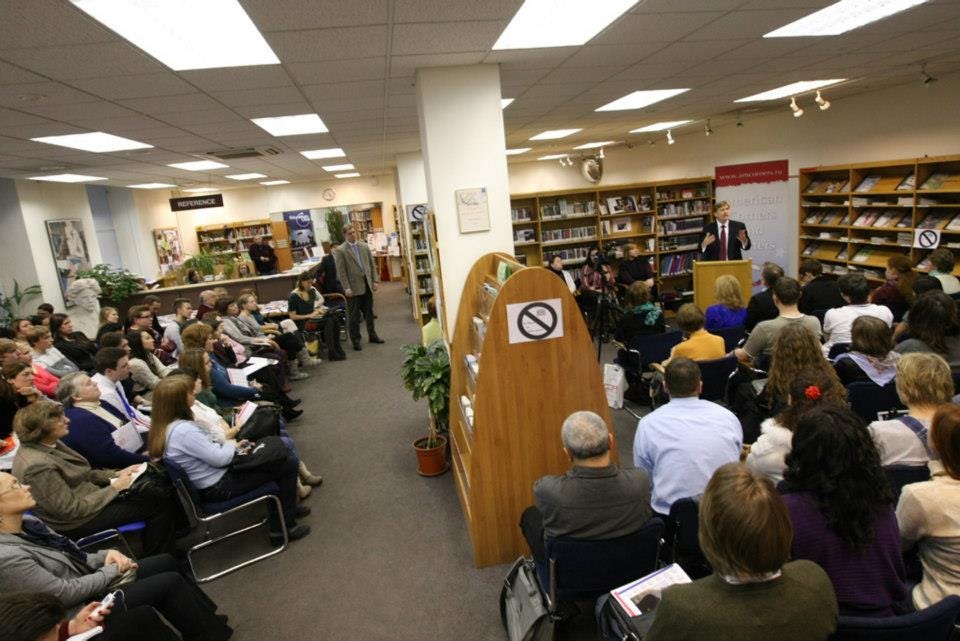When I was serving as the U.S. Ambassador to Russia, Martin Luther King Day was always special. It gave me the chance to speak bluntly about the flaws of American democracy, back in MLK’s day and now. But it also offered me the opportunity to speak about the possibility of renewal in democracies, an attribute missing in most autocracies. In fact, my last public talk in Moscow as Ambassador was on MLK Day in 2014.
Check out the picture from that talk below. The room was completely packed. Russians, especially young Russians, were interested in the MLK story too.
MLK’s story as I understand it (and I am not an expert) exposes lots of horrific features of our country’s political system, some of which linger to this day. Of course, Martin Luther King is most well-known as a human rights activist who led a national movement against white supremacy and illegitimate laws to secure equal rights for African Americans. That the United States needed such a movement a hundred years after the Civil War underscores how deeply flawed our democracy was in the 1960s. Martin Luther King was also an anti-war protestor, committed to trying to end the American war in Vietnam. Again, we wouldn’t have needed anti-war leaders like Martin Luther King in the 1960s had the American political system not allowed its leadership to make the mistake of dragging the United States into that horrific, unnecessary war. Martin Luther King also fought against American poverty, another blemish of the American system that continues to this day. And MLK’s story reveals two additional embarrassing facts about the American political system. First, our own government, led by the FBI, wrongly surveilled, harassed, and slandered MLK, labeling him a communist. Genuinely democratic governments are not supposed to do that. Second, a fellow American, armed with a gun, killed this great American. It’s hard to remember all these facts about Martin Luther King’s life and then praise the virtues of American democracy.
In fact, back then, Soviet communist leaders were reminding their citizens and the world of these deep problems in the American system of government. In the 1960s and early 1970s, American democracy did seem flawed unjust, and decaying, culminating in the resignation of President Nixon. Around the world, democracy also seemed to be in decline at precisely the same time when communist regimes seemed to be gaining appeal and taking hold all over the world, from Vietnam, Cambodia, and Laos, to Angola and Mozambique, to Nicaragua. The “correlation of forces,” as the Soviets called it back then, seemed to be on the side of communism and against democracy.
But democracies, as King’s legacy proved, have one great superpower that dictatorships do not – the possibility for self-correction and renewal. American democratic institutions, as flawed as they were in the 1960s, still created the permissive conditions for King to succeed as a grass-roost societal leader. King was never president or a governor or a commander of the armed forces. But he successfully and peacefully used the democratic rules of the American political system to improve that system by pushing for legislation and norms that improved the quality of American democracy. Obviously, the line of democratic improvement is not straight. It zigs and zags as our recent history shows. But as a phrase stitched into the carpet of my old boss, President Barack Obama, said “the arc of the moral universe is long, but it bends towards justice.” And that is truer in democracies than autocracies. After the dark days of the 1960s and early 1970s, our democratic system got better. Soviet communism did not.
While I working as a U.S. ambassador to Russia, Putin’s regime was becoming even more autocratic. It became increasingly dangerous to criticize his government. That’s why my telling the story of MLK in Russia was so threatening, first because I openly discussed the flaws of our American political system – something a Russian government official at the time would never do – and second because Martin Luther King proved the potential for renewal in democracies, opportunities that Russian human rights leaders back then, let alone today, did not enjoy.
Correlation is not causation. But I am struck by the fact that soon after giving my last public address in Russia about Martin Luther King, I was banned from ever returning to the country.
Well, hopefully not forever. I remain optimistic that Russian democrats -- inspired by the ideas and methods of Martin Luther King -- some of whom are sitting in a Russian jail today, might someday have the opportunity to make their political system more democratic too. And if they do, I hope to get back to Moscow to celebrate Martin Luther King Day with them once again.






Thanks, what a great cultural exchange. I bet you learned a lot from them and them from you.
Yesss Professor Mike!! I too believe you will go back to celebrate it in Russia again one day. Regarding imprisoned Russian democratic leaders - I wonder if Navalny is inspired by the ideas and methods of MLK. I hope so. Do you think so? I pray for Germany’s success in putting pressure on Putin to release Navalny from jail or at least for him to receive swift legitimate medical care. I wish the US could put the same kind of pressure. In other news: great job on Lawrence O’Donnell’s show tonight! 💚